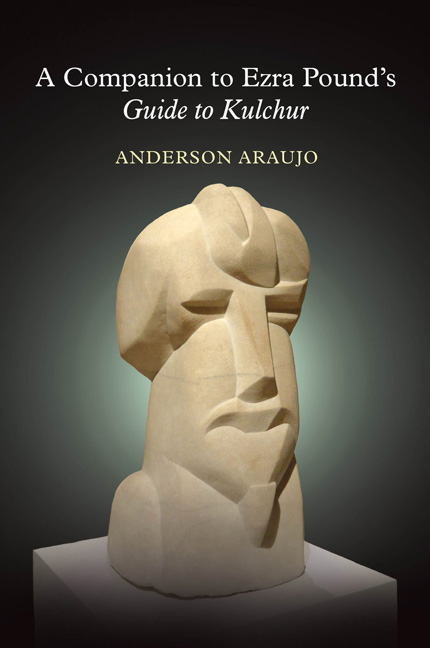Book contents
- Frontmatter
- Contents
- Acknowledgments
- Abbreviations
- Introduction
- Guide to Kulchur
- Part I
- Section I
- Section II
- 6 Vortex
- 7 Great Bass: Part One
- 8 Ici Je Teste
- 9 Tradition
- Part II
- Section III
- Section IV
- Part III
- Section V
- Section VI
- Part IV
- Section VII
- Section VIII
- Section IV
- Part V
- Section X
- Section XI
- Part VI
- Section XII
- Section XIII
- Addenda: 1952
- Notes
- Index
8 - Ici Je Teste
from Section II
- Frontmatter
- Contents
- Acknowledgments
- Abbreviations
- Introduction
- Guide to Kulchur
- Part I
- Section I
- Section II
- 6 Vortex
- 7 Great Bass: Part One
- 8 Ici Je Teste
- 9 Tradition
- Part II
- Section III
- Section IV
- Part III
- Section V
- Section VI
- Part IV
- Section VII
- Section VIII
- Section IV
- Part V
- Section X
- Section XI
- Part VI
- Section XII
- Section XIII
- Addenda: 1952
- Notes
- Index
Summary
Ici Je Teste: (Fr.) “Here, I Test.”
The XIXth, or most infamous, century: Pound's dismissal of the nineteenth century reflects his longstanding antipathy for much of the period. In “A Retrospect” (1918), he describes it as “a rather blurry, messy sort of a period, a rather sentimentalistic, mannerish sort of a period.”
the Church's best friend was Cavour: Camillo Benso, Count of Cavour (1810–61), Italian statesman and the country's first Prime Minister. Cavour was a prime mover in the unification of Italy under King Vittorio Emanuele II (1820–78). Il Risorgimento, the journal he founded in 1847, primarily aimed to support unification. Cavour subscribed to the separation of church and state, but also believed, as his famous slogan indicates, in “a free Church in a free State,” that is, ecclesiastical autonomy respectful of the legitimate rights of the secular, liberal state. Pope Pius IX (1792–1878) was never thoroughly convinced that his loss of temporal power would not threaten his independence as spiritual leader of the Church. Yet, Cavour was proven right in the end. The spiritual prestige of the Catholic Church continued to grow even after the pope's temporal power ended in 1870.
Cardinal Antonelli: Giacomo Antonelli (1806–76), Cardinal Secretary of State (1848–76) under Pope Pius IX, vehemently opposed the unification of Italy, the Risorgimento championed by Cavour.
Concordat: The Italian Concordat or Conciliazione of 1929 between Pope Pius XI (1857–1939) and Mussolini entailed, among other things, the Fascist regime's official recognition of the sovereignty of the Vatican City and the recovery of some of the Church's powers, privileges, and property taken away by ecclesiastical legislation during the Risorgimento. The Concordat in effect was the realization of Cavour's idea of “a free Church in a free State.”
Quadrigesimo Anno and the other economic passages from the Encyclicals: Pope Pius XI's encyclical, Quadragesimo Anno (1931) (Pound misspells the first word), was one of several papal encyclicals addressing sociopolitical subjects.
- Type
- Chapter
- Information
- A Companion to Ezra Pound's Guide to KulcherGuide to Kulcher, pp. 108 - 112Publisher: Liverpool University PressPrint publication year: 2018



